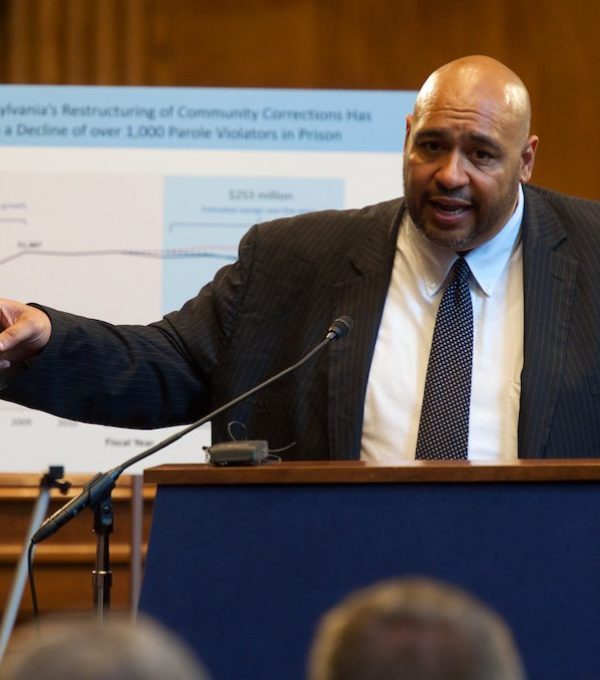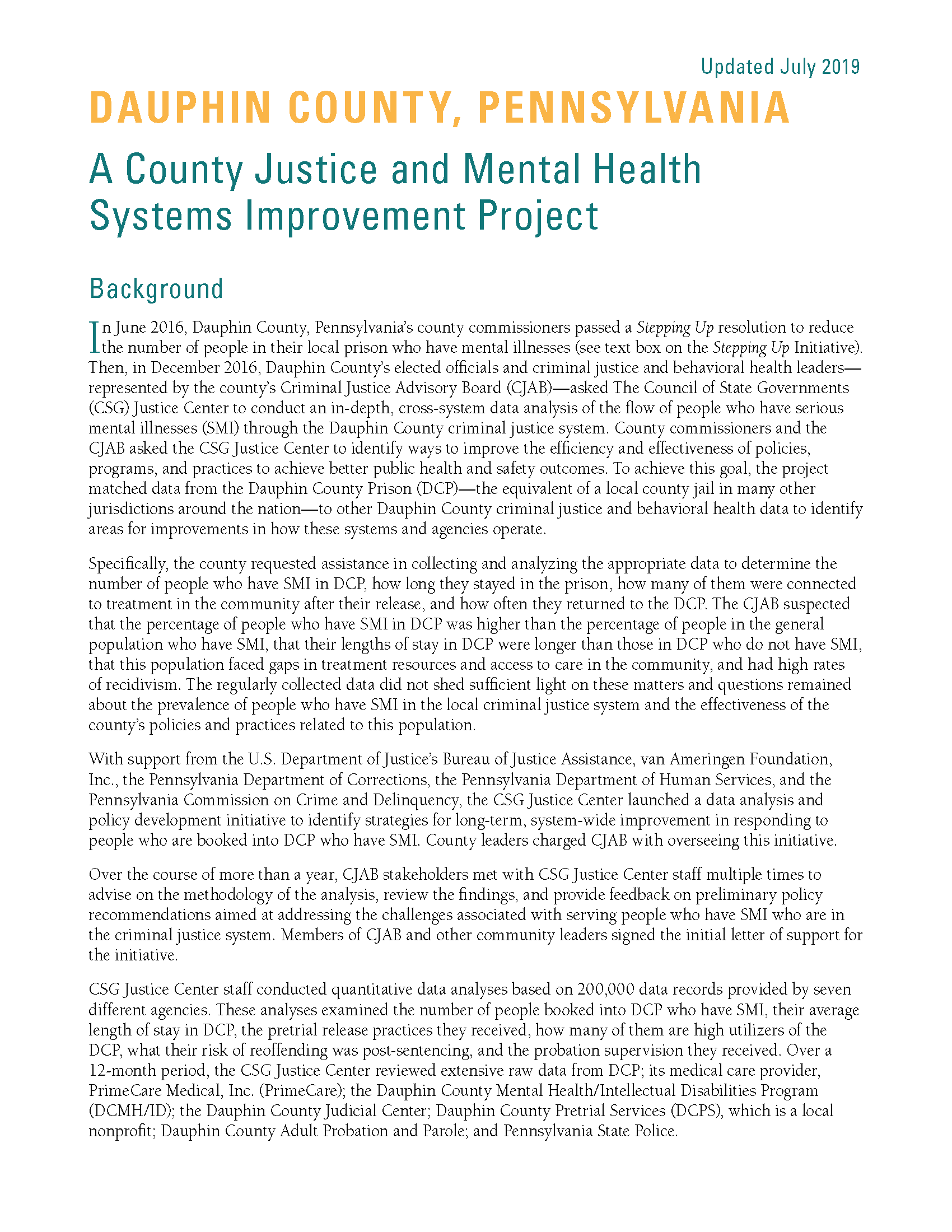Dauphin County, Pennsylvania: A County Justice and Mental Health Systems Improvement Project
The CSG Justice Center conducted an in-depth, cross-systems data analysis of the flow of people who have serious mental illnesses (SMI) through the Dauphin County criminal justice system. This report includes the key findings and policy recommendations.
In June 2016, Dauphin County, Pennsylvania’s county commissioners passed a Stepping Up resolution to reduce the number of people in their local prison who have mental illnesses. Then, in December 2016, Dauphin County’s elected officials and criminal justice and behavioral health leaders—represented by the county’s Criminal Justice Advisory Board (CJAB)—asked the CSG Justice Center to conduct an in-depth, cross-systems data analysis of the flow of people who have serious mental illnesses (SMI) through the Dauphin County criminal justice system. County commissioners and the CJAB asked the CSG Justice Center to identify ways to improve the efficiency and effectiveness of policies, programs, and practices to achieve better public health and safety outcomes.
Based on a quantitative and qualitative analysis, and with the guidance of members of CJAB and other senior county and state leaders, five key findings were identified that prompted the development of a set of strategic policy recommendations to improve outcomes for people in Dauphin County’s criminal justice system who have SMI. This report, from the CSG Justice Center, includes the key findings and policy recommendations.

The Dauphin County Board of Commissioners recently endorsed a comprehensive plan that…
Read More
“Every single meeting that I have with law enforcement, the number one…
Read More
Leaders in Dauphin County, Pennsylvania, recently launched a data-driven project as part…
Read MoreThe sharp rise in school shootings over the past 25 years has led school officials across the U.S.…
Read MoreA three-digit crisis line, 988, launched two years ago to supplement—not necessarily replace—911. Calling 988 simplifies access to…
Read MoreIt would hardly be controversial to expect an ambulance to arrive if someone called 911 for a physical…
Read More Taking the HEAT Out of Campus Crises: A Proactive Approach to College Safety
Taking the HEAT Out of Campus Crises: A Proactive Approach to College Safety
The sharp rise in school shootings over the past 25 years has led school officials across the U.S. to take a closer look at ways to keep students safe. For Chaffey College in Rancho Cucamonga, California, a tragic incident at a nearby university hit close to home and spurred campus leaders to revisit their own school’s threat assessments and crisis responses.
Read More From 911 to 988: Salt Lake City’s Innovative Dispatch Diversion Program Gives More Crisis Options
From 911 to 988: Salt Lake City’s Innovative Dispatch Diversion Program Gives More Crisis Options
A three-digit crisis line, 988, launched two years ago to supplement—not necessarily replace—911. Calling 988 simplifies access to services when people are seeking help for themselves or loved ones with suicidal thoughts, behavioral health concerns, or substance use-related crises.
Read More Matching Care to Need: 5 Facts on How to Improve Behavioral Health Crisis Response
Matching Care to Need: 5 Facts on How to Improve Behavioral Health Crisis Response
It would hardly be controversial to expect an ambulance to arrive if someone called 911 for a physical health emergency. And yet, for years, the default responders for a behavioral health emergency have been law enforcement officers, not behavioral health professionals.
Read More The 10-Year Impact—and Future—of Stepping Up: Facing the Behavioral Health Crisis in Jails and Communities with Real Solutions
The 10-Year Impact—and Future—of Stepping Up: Facing the Behavioral Health Crisis in Jails and Communities with Real Solutions
As the Stepping Up initiative marks its 10th year, America’s justice and behavioral health systems are facing a shared crisis: how to meet the behavioral health needs of people cycling through jails.
Read More A “Once in a Generation Opportunity” to Improve Reentry for Nearly 2 Million People
A “Once in a Generation Opportunity” to Improve Reentry for Nearly 2 Million People
19 states were recently granted permission by CMS to reimburse critical reentry services with Medicaid funding for up to 5 years.
Read More Local Criminal Justice System Innovations in Mental Health Services: Q&A with CSG Justice Center Advisory Board Member Dr. Doreen Williams
Local Criminal Justice System Innovations in Mental Health Services: Q&A with CSG Justice Center Advisory Board Member Dr. Doreen Williams
"It is the humane, person-centered approach that supports and stabilizes individuals, their families, and their communities."
Read More










